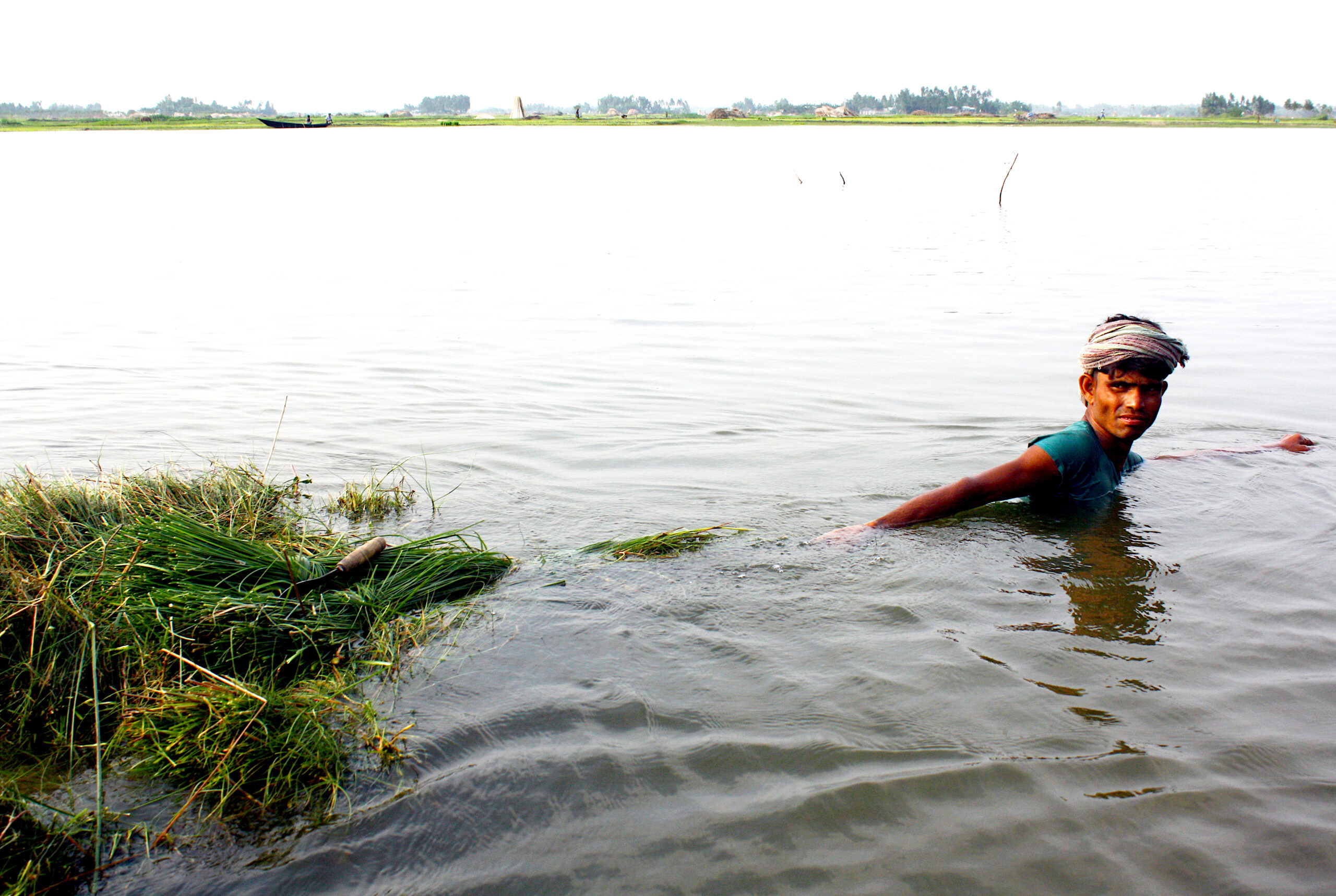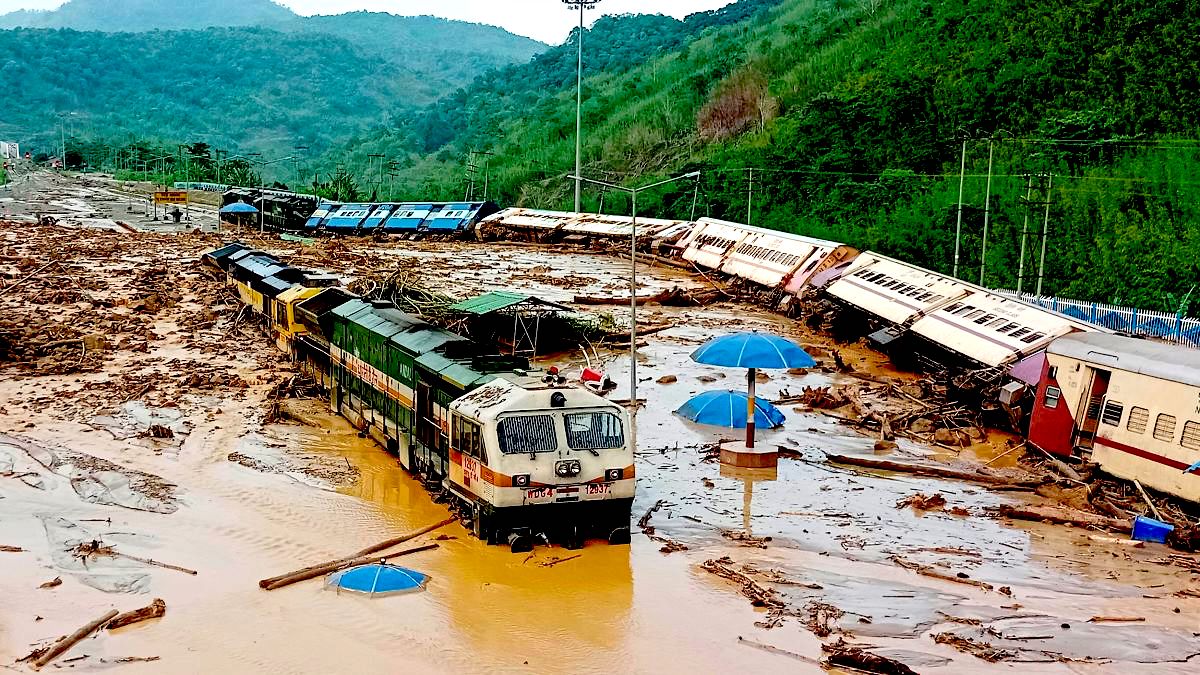Developed countries must take responsibility for the climate crisis they initiated by paying reparations to developing countries, writes Tapti Sen. There’s a number of ways they could do this.
am from a disappearing nation.
My country, Bangladesh, is one of several at risk of becoming submerged partially or completely by rising sea levels caused by climate change in the coming decades. 75 percent of the country lies below sea level.
Bangladesh, a tropical country on top of a low-lying delta, is no stranger to flooding, especially during monsoon season. But the extent to which this flooding has taken place in recent years is unprecedented.
Flooding in Sylhet and other northeastern districts of Bangladesh between May and June of 2022 displaced an estimated 15 million people — approximately 9 percent of the country — and toppled hundreds of villages in 2022 alone.
Flooding and torrential rains in July 2020 led to the submerging of nearly a quarter of Bangladesh.
All of this flooding and damage has taken an undeniable toll on the nation. Data demonstrates that between 2000 and 2019, Bangladesh suffered $3.72 billion worth of economic losses due to climate change.
Despite its low-carbon output both historically and in the present-day, the country is disproportionately impacted by climate change due to its location.
International and humanitarian organizations have responded to these annual crises as they always do: with donations upon donations upon donations. But using relief and donation requests to combat climate problems is a flawed approach.
Humanitarianism stems from noble intentions, but societies have grown complacent with philanthropic interventions during crises, which avoid the duty to deal with structural issues.
We praise charity efforts as generous, without critiquing why they are made necessary in the first place. Take, for example, the members of the Bangladeshi army who gave up a day’s worth of their salary to contribute to flood-related fundraising efforts. Some international organizations are enacting preventative measures for climate disasters.
The United Nations Office for the Coordination of Humanitarian Affairs, for instance, has established different anticipatory action frameworks in what they deem “high risk countries,” which allowed them to allocate relief funds to Bangladesh even before the monsoon flooding started this year.
Given the subsequent toll of the floods, it’s clear that even these preventative measures aren’t enough to mitigate these disasters.
All of this considered, it’s no surprise that numerous Bangladeshi politicians, who formerly took on active roles during national humanitarian crises, took a back seat.
We talk about Bangladesh’s climate crisis as if it was inevitable, as though Bangladesh is simply a victim of its location.
British Plundering

Because of flooding in 2011, a young man’s home in Bangladesh is underwater and he is forced into a dangerous search for fodder for his cattle. (Shahriar Islam, AusAID, Wikimedia Commons, CC BY 2.0)
But the reality is much more sinister. Developed nations are largely responsible for the state of Bangladesh’s climate catastrophes.
Between 1765 and 1938, Britain plundered almost $45 trillion from the Indian subcontinent. Within this looting was “the financial bleeding of Bengal,” filled not only with the ransacking of its treasuries and towns for money, but the exploitation of its workers and artisans for complex and raw materials alike.
It’s no surprise that British colonization and imperialism goes hand in hand with its industrialization, considering that the Industrial Revolution demanded cheap raw materials and money in order for factories to produce and over-produce and pollute.
Essentially, it’s not inaccurate to say that a major reason for Bangladesh’s climate and flooding crisis is its colonization under the British Raj.
When we talk about CO2 emissions and responsibility, we need to focus on cumulative historical emissions, as those are the causes of the ongoing climate crisis.
The data shows that 23 rich, developed countries, including the United States, Germany, the United Kingdom, and France are responsible for half of all historical CO2 emissions, with more than 150 countries responsible for the other half.
Up until 1950, more than half of historical CO2 emissions were emitted by Europe, with the vast majority of European emissions being emitted by the U.K.. While the U.K.’s carbon imprint has lessened since then, should it not take responsibility for the consequences of its past actions?
And today, rich countries like the U.S., Germany, and the U.K. are among the top 5 CO2-emitting countries. Why should Bangladesh have to suffer for the past and present extravagances of its colonizers?
Developed countries are primarily responsible for our current climate crisis, but it is developing countries that are the most vulnerable to its effects.
Global warming, which has increased the economic inequality gap between the Global South and Global North by a whopping 25 percent, punishes the economically vulnerable over the rich, the colonized over the colonizers, and it’s clear, therefore, that this climate crisis isn’t just an environmental issue: it’s about colonialism and imperialism and poverty and every systemic structure that has inequality enshrined in its foundations.
Developed Nations’ Responsibility

Railway station after floods in Assam, India, 2022. (Wikimedia Commons, CC BY-SA 4.0)
Developed countries must take responsibility for the climate crisis they initiated by paying reparations for developing countries. And there’s a number of ways they could do this.
One very tangible way for developed countries to pay reparations is the reallocation of Special Drawing Rights (SDRs).
SDRs are supplementary foreign exchange reserve assets maintained by the International Monetary Fund. Certain numbers of them are distributed to banks and treasuries around the world, allowing financial institutions fallback options when they need to dip into their financial reserves during crises.
However, SDRs are currently allocated by quota, which means that low-income developing countries like Bangladesh receive 1.4 percent, high-income developing countries like China receive 22 percent, and rich countries such as the U.S. and the U.K. receive over 60 percent.
Of course, rich countries rarely, if ever, need to dip into their SDRs, whereas low-income countries often rely upon theirs. Ending this quota system and reallocating SDRs to the countries most vulnerable to climate change is a feasible way to dedicate existing resources to climate change mitigation.
Considering that they don’t even use their SDRs, developed countries have no incentive not to do this.
In the same vein, countries could assist developing countries in undertaking various climate mitigation and adaptation projects. Climate mitigation refers to actions that involve reducing the levels of greenhouse gases in the atmosphere, either by reducing the point source pollution (eg. the burning of fossil fuels for electricity) or by enhancing the sinks that store these gases (eg. forests).
Currently, around 63 percent of Bangladesh’s energy comes from natural gas. While the government is exploring alternate renewable energy sources, the country is already enduring a massive energy crisis leading to widespread load-shedding.
Bangladesh can’t just simply make the switch from one energy source to another. However, developed nations could funnel resources towards Bangladeshi projects to develop renewable, well-explored sources of energy such as tidal and wind, stopping a bad situation from getting worse.
Climate adaptation is just as necessary as climate mitigation. Developed countries could aid in numerous climate adaptability projects, including working with local farmers to develop new agricultural practices less vulnerable to the floods, strengthening coastal tracts of land, preventing the salinization of already scarce drinking water, or building “climate-friendly towns.”
While NGOs have aided Bangladesh in these ventures, developed countries should also use their own resources in this transformation.
But climate change devastation simply can’t be avoided through mitigation and adaptation techniques alone: frontline countries need financial support to repair from inevitable disasters.
The economic costs among developing countries for these losses and damages is expected to reach $200-580 billion by 2030. The Glasgow Dialogue was established by the 2021 UN Climate Change conference (or colloquially, COP26) in response to calls from developing nations regarding assistance during environmental climate crises.
Zowa Shawoo, scientist at the Stockholm Environment Institute, outlines different principles the U.N. and developed nations could use for financing loss and damage, like providing a needs-based finance on a country-by-country basis or ensuring that national systems are used to distribute the funds.
All countries owe climate refugees recognition and safe harbor. Over 21.5 million people across the world have already been displaced due to climate change.
However, many countries, including the U.S., don’t actually recognize climate refugees as “refugees”. Those who face persecution not from other people but from human-induced environmental threats are often unable to apply for asylum or access shelter, food, or basic necessities. This neglect causes climate refugees to, as NPR puts it, “fall between the cracks.”
Developed nations act less concerned about climate change because, in the next few decades, at least, disasters and sea-level changes won’t entirely disrupt or affect them (and also because corporations profit off environmental degradation).
But we fail to recognize how global and interconnected our world is now. Bangladesh, for instance, is among the top exporters of textiles in the world.
When it goes underwater, that void can’t easily be filled by some other developing country taking up the burden. While climate change losses may seem relatively small now, the positive feedback loop of global warming means each and every one of them will have massive global ramifications in the future.
At its core, climate change is a form of genocide — not only human and environmental genocide, but cultural genocide too. With every inch of Bangladesh that goes under, every village that’s lost, every province flooded, a part of Bengali culture disappears with it: customs forgotten, ancestral homelands abandoned and submerged.
Those of us from developing and formerly colonized countries have already lost so much, have already had so much of our histories erased through the imperialism and dehumanization of our peoples. We are strong — undergoing colonization necessitated that strength — but how much more can we bear?
If Bangladesh sinks – when Bangladesh sinks – it won’t be an abstract environmental loss, but the last breath of a people that started dying the minute the British landed on Indian soil.
Developed countries created this climate disaster. Now they need to fix it.
Tapti Sen is an Inequality.org Next Leader at the Institute for Policy Studies
This article is from Inequality.org.
The views expressed are solely those of the author and may or may not reflect those of Consortium News.